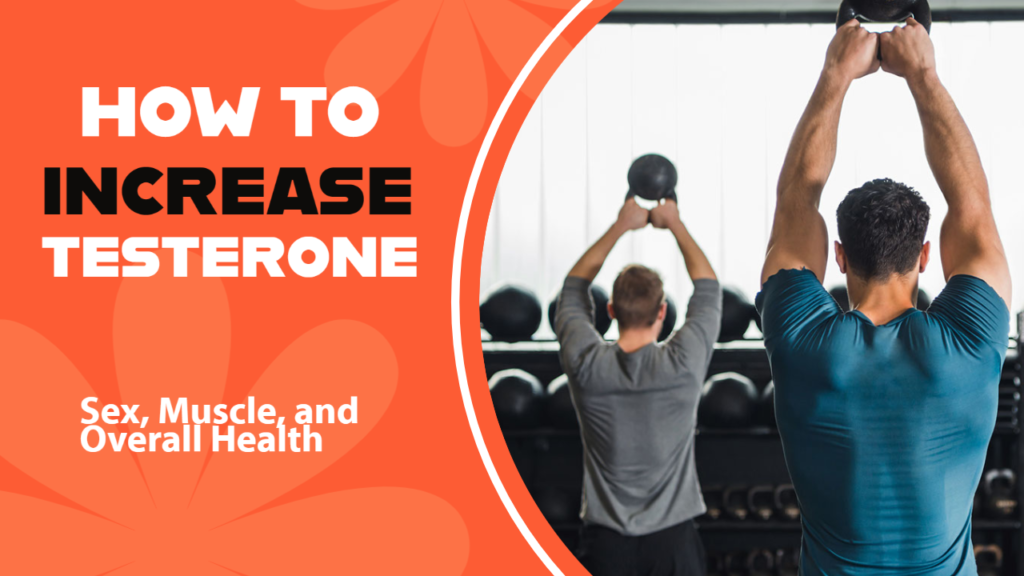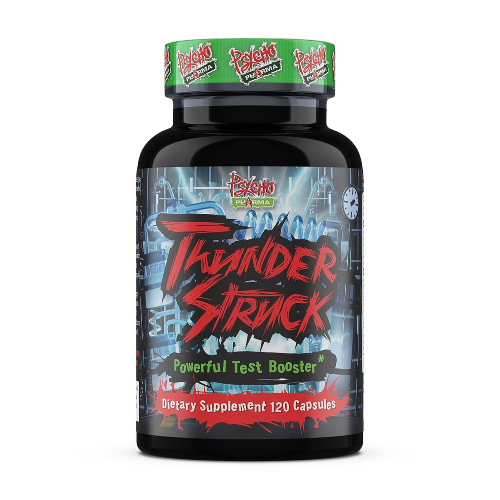Testosterone is a vital hormone that plays a crucial role in various aspects of our health, including sex drive, muscle growth, bone density, and overall well-being. When our testosterone levels are optimal, we feel energetic, motivated, and experience improved sexual performance. However, as we age, our testosterone levels naturally decline, which can lead to a decrease in libido, loss of muscle mass, and a decline in overall vitality.
Fortunately, there are several natural ways to increase testosterone levels and enjoy the benefits it offers. In this comprehensive guide, we will explore effective strategies to boost your testosterone levels, enhance your sex drive, build muscle, and improve your overall health. Let’s dive in!

Understanding Testosterone: The Key to Vitality
Before we delve into the strategies to increase testosterone, it is essential to understand the significance of this hormone in our body. Testosterone, primarily produced in the testicles in males and ovaries in females, is responsible for the development of male characteristics and plays a vital role in various bodily processes.
During fetal development, testosterone triggers the growth of male internal and external reproductive organs. In puberty, testosterone is responsible for the physical changes observed in individuals assigned male at birth, such as height increase, body and pubic hair growth, and an enlargement of the penis, testes, and prostate gland. In adulthood, testosterone ensures the production of sperm, promotes the formation of red blood cells, maintains bone and muscle strength, and enhances libido and overall well-being. (3)
The Importance of Optimal Testosterone Levels
Having optimal testosterone levels is crucial for both men and women. In men, testosterone is vital for maintaining muscle mass, regulating fat distribution, promoting bone density, and supporting sexual function. Low testosterone levels in men can lead to decreased libido, erectile dysfunction, loss of muscle mass, increased body fat, and reduced energy levels.
For women, testosterone is essential for maintaining libido, promoting bone health, and supporting overall well-being. While women naturally have lower levels of testosterone compared to men, a decrease in testosterone can still result in reduced sexual desire, fatigue, and decreased vitality.
Natural Ways to Increase Testosterone Levels
Now that we understand the importance of testosterone, let’s explore effective strategies to naturally boost your testosterone levels and reap the benefits it offers.
- Get Sufficient Quality Sleep
Quality sleep is crucial for maintaining balanced hormone levels, including testosterone. Lack of sleep or impaired sleep has been linked to lower testosterone levels. Studies have shown that sleep deprivation can lead to a significant decrease in testosterone levels, impacting various bodily processes.
To ensure you’re getting enough quality sleep, aim for at least seven to eight hours of uninterrupted sleep each night. Establish a relaxing bedtime routine, create a sleep-friendly environment, and prioritize sleep as an essential aspect of your overall well-being. (2)
- Follow a Balanced and Nutritious Diet
Your diet plays a significant role in testosterone production and overall hormonal balance. Instead of constant dieting, focus on maintaining a well-balanced diet consisting of whole foods. Properly balancing your macronutrients, including proteins, carbohydrates, and fats, can help optimize testosterone levels.
Protein-rich foods help limit the production of sex hormone-binding globulin, allowing your body to produce more free testosterone. Incorporate lean meats, poultry, fish, eggs, and plant-based protein sources into your diet.
Carbohydrates are essential for controlling cortisol levels, a hormone that can negatively affect testosterone production. Include whole grains, fruits, vegetables, and legumes in your meals to ensure an adequate carbohydrate intake.
While fats should be consumed in moderation, healthy fats like avocados, nuts, seeds, and olive oil can support testosterone production. Avoid low-fat diets, as they have been shown to decrease testosterone levels.
- Manage Stress Levels
Chronic stress can have a detrimental impact on testosterone levels. When you experience prolonged periods of stress, cortisol levels increase, which can suppress testosterone production. Additionally, stress may lead to unhealthy behaviors such as overeating, which can further impact testosterone levels.
To manage stress effectively, incorporate stress-reducing techniques into your daily routine. Engage in activities such as meditation, deep breathing exercises, yoga, or regular physical exercise to help alleviate stress and promote hormonal balance. (1)
- Engage in Regular Exercise and Resistance Training
Physical activity and regular exercise have been shown to positively influence testosterone levels. Studies have found that active individuals, especially those who engage in resistance training or weightlifting, have higher testosterone levels compared to sedentary individuals.
To optimize testosterone production, incorporate both cardiovascular exercises and resistance training into your fitness routine. Aim for at least 150 minutes of moderate-intensity aerobic activity or 75 minutes of vigorous-intensity aerobic activity per week, along with two or more days of resistance training targeting different muscle groups.
- Maintain a Healthy Weight
Maintaining a healthy weight is crucial for hormonal balance, including testosterone levels. Excess body fat, especially around the abdominal area, has been associated with lower testosterone levels. Losing weight and reducing body fat can help increase testosterone production.
To achieve and maintain a healthy weight, focus on a combination of regular physical activity, a balanced diet, and portion control. Incorporate strength training exercises to build lean muscle mass, which can further support testosterone production.
- Ensure Sufficient Vitamin D Levels
Vitamin D plays a vital role in testosterone production. Studies have shown that individuals with low vitamin D levels often have lower testosterone levels. Increasing your vitamin D intake through sunlight exposure or supplementation may help optimize testosterone levels.
Spend time outdoors to expose your skin to sunlight, especially during the early morning or late afternoon when the sun’s rays are less intense. Additionally, consider incorporating vitamin D-rich foods into your diet, such as fatty fish (salmon, mackerel), fortified dairy products, and egg yolks. Consult with a healthcare professional to determine if vitamin D supplementation is necessary.
- Limit Alcohol Consumption
Excessive alcohol consumption can negatively impact testosterone levels. Studies have shown that chronic alcohol abuse can lead to a decrease in testosterone production and disrupt hormonal balance.
To support optimal testosterone levels, limit alcohol consumption to moderate levels. The Centers for Disease Control and Prevention (CDC) defines moderate drinking as up to one drink per day for women and up to two drinks per day for men.
- Get Regular Sunlight Exposure
Sunlight exposure plays a crucial role in testosterone production. The skin absorbs sunlight, which triggers the synthesis of vitamin D, a key nutrient for testosterone production.
Spend time outdoors, especially during the early morning or late afternoon when the sun is less intense. Engage in activities that allow for sunlight exposure, such as walking, gardening, or outdoor sports. Remember to protect your skin from excessive sun exposure by wearing sunscreen and appropriate clothing.
- Stay Hydrated
Proper hydration is essential for overall health and hormonal balance, including testosterone production. Dehydration can negatively affect hormone levels, including testosterone.
Drink an adequate amount of water throughout the day to ensure proper hydration. The Institute of Medicine recommends a daily water intake of approximately 3.7 liters (about 13 cups) for men and 2.7 liters (about 9 cups) for women.
- Consider Natural Testosterone-Boosting Supplements
In addition to lifestyle changes, certain natural supplements may support testosterone production. However, it is essential to consult with a healthcare professional before incorporating any supplements into your routine. Some supplements that have shown potential in boosting testosterone levels include: (4)
- Tribulus terrestris: A plant extract that may enhance testosterone production and improve sexual function.
- Ashwagandha: An adaptogenic herb that may reduce stress and promote testosterone production.
- D-Aspartic Acid: An amino acid that may stimulate testosterone synthesis.
Remember, supplements should be used as a complement to a healthy lifestyle and should not replace proper nutrition or medical advice.
Monitoring and Seeking Medical Advice
While the strategies mentioned above can be beneficial for naturally increasing testosterone levels, it is essential to monitor your progress and seek medical advice if needed. If you suspect low testosterone levels or experience persistent symptoms such as low libido, fatigue, or muscle loss, consult with a healthcare professional who specializes in hormone health.
A healthcare professional can conduct a thorough evaluation, including blood tests to measure testosterone levels and assess any underlying conditions that may be contributing to hormonal imbalances. Based on the results, they can provide personalized recommendations and, if necessary, prescribe hormone replacement therapy or other appropriate treatments.
Conclusion
Optimizing testosterone levels is crucial for maintaining sexual health, promoting muscle growth, and enhancing overall well-being. By implementing lifestyle changes such as prioritizing quality sleep, following a balanced diet, managing stress, engaging in regular exercise, and maintaining a healthy weight, you can naturally boost your testosterone levels and enjoy the benefits it offers.
Remember, it is essential to consult with a healthcare professional before making any significant changes to your lifestyle or incorporating supplements. They can provide personalized guidance based on your specific needs and help monitor your progress along the way. Start taking proactive steps to increase your testosterone levels today and unlock your full potential for a vibrant and healthy life.




